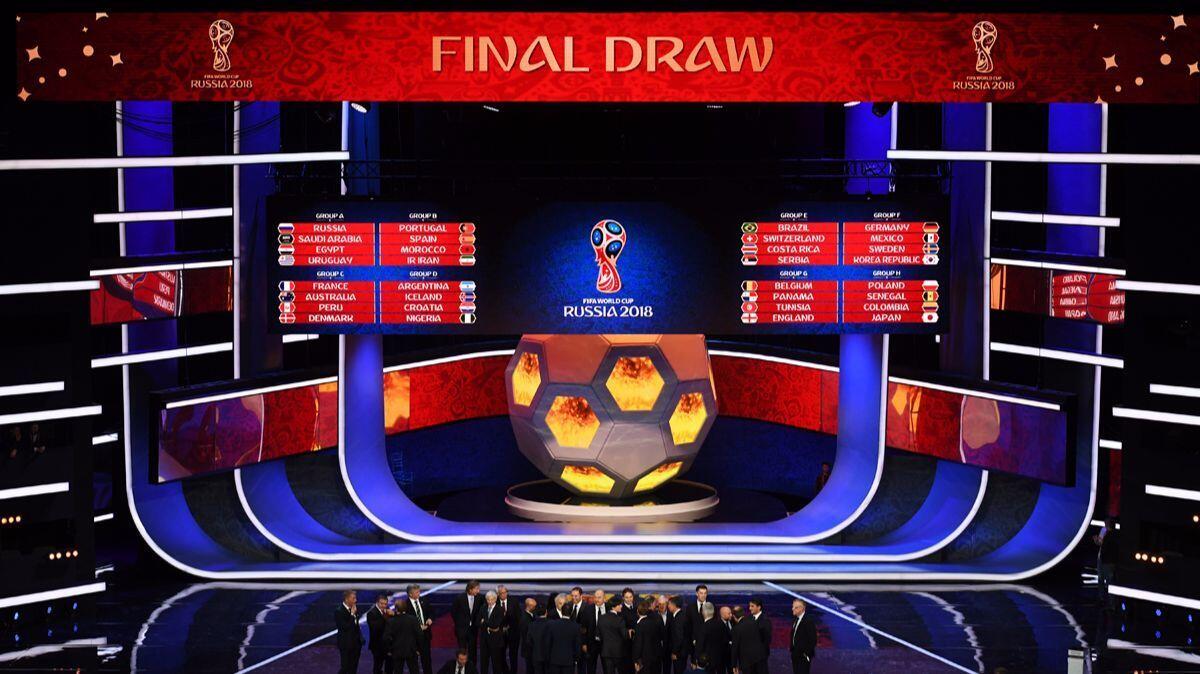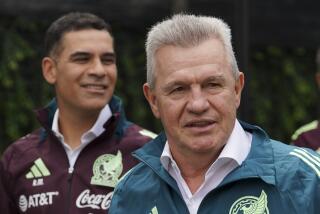World Cup draw: Mexico faces tough road; rivals Portugal, Spain to meet in group opener

Mexico’s preparation for next summer’s World Cup couldn’t have gone much better.
It lost just once in 16 qualifiers, winning the regional tournament for the first time in a generation. In the last five months it has held its own in games against Belgium, Portugal and Poland, all ranked among the top six in the world. And its two-year record under Juan Carlos Osorio is the best of any national team manager who has coached more than 16 games.
All that might have been wiped out Friday, however, when the World Cup draw in Moscow placed El Tri in a group with defending champion Germany, Sweden and South Korea.
The World Cup will kick off June 14 with Russia, the host nation, facing Saudi Arabia in Moscow’s Luzhniki Stadium. That’s not exactly a compelling matchup since FIFA ranks the teams 65th and 63rd in the world, respectively, making them the two worst teams in the tournament.
But at least they’re in the tournament. The U.S., which finished fifth in the six-team CONCACAF qualifying competition won by Mexico, will miss the World Cup for the first time in 32 years. Also in Group A with Russia and Saudi Arabia is Egypt, making its second World Cup appearance and first since 1990, and Uruguay, the foursome favorite.
Mexico’s goal in Russia is to reach the quarterfinals, something it hasn’t done since 1986. But Friday’s draw, held on a snowy evening in the 6,000-seat State Kremlin Palace, has complicated that. Because Mexico not only opens its tournament against four-time champion Germany, the No. 1 team in the world, it could face five-time champion Brazil in the knockout round should it advance out of Group F as the second-place team.
After the draw, Osorio and his players said they welcomed the challenge.
“Mexico has a history of rising to the challenge against top rivals and I hope this will be no exception,” midfielder Andres Guardado, speaking in Spanish, told Telemundo. “I hope that we can show in the group phase that we are going to have a historic World Cup.”
Osorio told Mexican TV he’s not looking past the opener.
“This is the most important match, obviously,” he said. “We need to plan, prepare and consider it as though it were the first and last one.
“Personally, I am very excited and I am of the belief that on any given day in soccer, anyone can win.”
Mexico lost 4-1 to a German “B” team in the semifinals of last summer’s Confederations Cup in Russia. A similar result next summer would hardly spell the end of Mexico’s World Cup, though, since Sweden and South Korea complete the group.
Sweden went winless with Zlatan Ibrahimovic at Euro 2016 and isn’t likely to do much better without its captain, who has retired from international play. South Korea, meanwhile, is ranked No. 62 in the world. A win and a draw against those two could be enough to see El Tri through to the round of 16, which is where each of Mexico’s last six World Cups have ended.
Other interesting openers feature neighbors Spain and Portugal – the 2010 World Cup champion and the reigning European champion, respectively — in Group B while Belgium and England meet in the first Group G match.
In Group D, Argentina’s Lionel Messi (arguably the greatest player never to win a World Cup) will begin what figures to be his last run at a title against Iceland which, with just 332,000 people, is the least populated country to reach the World Cup.
“There’s a little romance in it,” said Iceland coach Heimir Hallgrimsson, whose country will be making its World Cup debut. “When you think about the World Cup you think about Argentina, Brazil. So it’s a little bit of romantic feeling to play Argentina in the first game.
“Of course we know how good they are.”
Things could get tougher for Argentina in the knockout rounds, however, because if it reaches the quarterfinals it will likely face either Spain or Portugal.
Peru, which won a playoff with New Zealand to earn its first World Cup berth since 1982, could stick around awhile after being drawn into Group C alongside France, Denmark and Australia. The South Americans are ranked 11th globally by FIFA.
Follow Kevin Baxter on Twitter @kbaxter11







